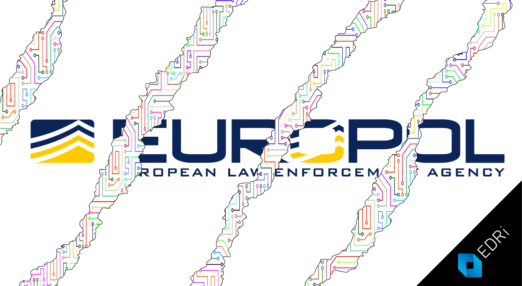Europol
Filter by...
-

Europol: Non-accountable cooperation with IT companies could go further
There is an ongoing mantra among law enforcement authorities in Europe according to which private companies are indispensable partners in the fight against “cyber-enabled” crimes as they are often in possession of personal data relevant for law enforcement operations. For that reason, police authorities increasingly attempt to lay hands on data held by companies – sometimes in disregard to the safeguards imposed by long-standing judicial cooperation mechanisms.
Read more
-

EU worries over the possibility of losing wiretapping powers
5G telecoms networks could render obsolete the “lawful interception” techniques that police is traditionally using, unless the European Union and national governments take action. This was revealed in internal EU documents obtained by EDRi member Statewatch, that has published a new analysis explaining the issues and calling for a public debate. “It is unsurprising that […]
Read more
-

All Cops Are Blind? Context in terrorist content online
The battle for the control of content and devices online has been at the centre of European policy-makers’ attention since the internet was created, but it has only increased in the recent years. Without any consideration for scientific literature on violent radicalisation factors, the current paradigm in the area of counter-terrorism leads to a proliferation […]
Read more
-

ENDitorial: The European Commission is talking “tough on terror”. Again.
The European Commission plans to issue a Regulation on 12 September 2018 that will get tough on internet companies in the fight against terrorism.
Read more
-

ENDitorial: The fake fight against fake news
The new danger is no longer yellow, but red once more: fake news. It helped getting Trump elected. It paved the highway to Brexit. Even local European elections are not safe. The greatest danger to our democracy in modern times must be fought by all possible means.
Read more
-

Hermes Center demands investigation of NAT-related data retention
On 27 March 2018, EDRi member Hermes Center for Transparency and Digital Human Rights filed a request with the Italian Data Protection Authority (DPA) to investigate on the widespread practice of logging Network Address Translations (NAT) by most of the telecommunication operators.
Read more
-

Europol: Delete criminals’ data, but keep watch on the innocent
Under the Europol Regulation, the agency must “support Member States' actions in preventing and combating forms of crime” such as terrorism and racism. However, much of the criminality that Europol works on is not harmonised on a EU level.
Read more
-

EU Commission’s Recommendation: Let’s put internet giants in charge of censoring Europe
On 1 March 2018, the European Commission proposed a "Recommendation" on the surveillance and filtering of the internet by online companies.
Read more
-

Q&A on the Recommendation on measures to “effectively tackle illegal content online”
Today, on 1 March 2018, the European Commission proposed a "Recommendation" on the surveillance and filtering of the internet by online companies
Read more
-

New EU network to combat the “challenges stemming from encryption”
The European Union intends to simplify investigative authorities’ access to encrypted content. This emerged from the replies to a questionnaire that was circulated to all Member States by the Slovak Presidency of the EU Council. After a “reflection process”, efforts in this area are, according to the summary of the replies, intended to give rise […]
Read more
-

Dutch government wants to keep “zero days” available for exploitation
The Dutch government is very clear about at least one thing: unknown software vulnerabilities, also known as “zero days”, may be left open by the government, in order to be exploited by secret services and the police. We all benefit from a secure and reliable digital infrastructure. It ensures the protection of sensitive personal data, […]
Read more
-

Joint Referral Platform: no proof of diligent approach to terrorism
On 28 April 2016, EDRi asked the Directorate-General for Migration and Home Affairs of the European Commission (DG Home) to release more information about a new initiative announced in April 2016, the Joint Referral Platform. What we knew already (or thought we knew) The existence of the Joint Referral Platform was disclosed on 20 April […]
Read more
